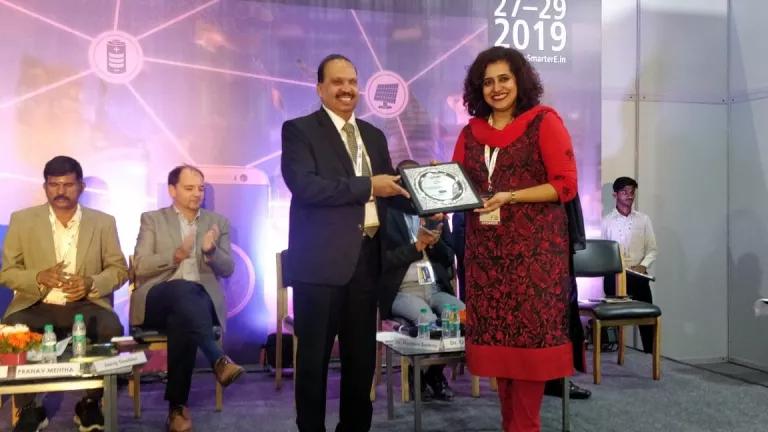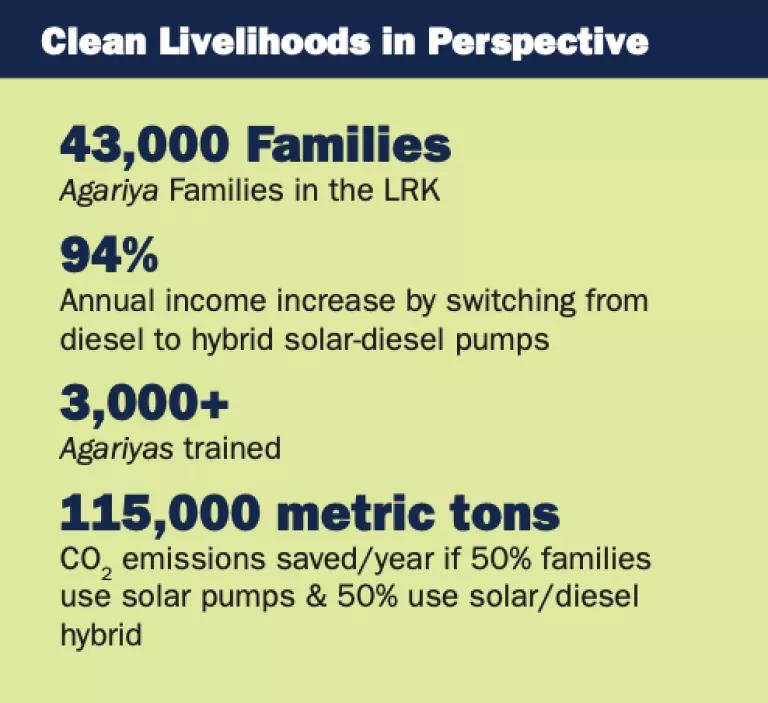
Guest Blog by Madhura Joshi, Lead Energy Access and Climate Policy Consultant NRDC
The Skill Council for Green Jobs (SCGJ) recognized NRDC as a "Valued Partner in Skill Gap Studies in Renewable Energy in India" at the Intersolar Conference held on 27-29 November in Bangalore, India.
Skill Council's Journey
The Skill Council for Green Jobs (SCGJ) of India is a council set up in 2015 as a part of Government of India’s Skill India Mission for developing competencies and skills in the domains of renewable energy and sustainable development. SCGJ has extensive alliances with the renewable energy sector and with over 350 affiliated training institutions, which have imparted training to about 70,000 candidates. SCGJ also focuses on entrepreneurship, specifically in rural areas, to promote sustainable development, and improvements in income and livelihoods.
During the past four years, SCGJ has carried out important National Level Skill gap studies for various renewable energy technologies. It has also successfully developed 49 qualification packs – the skill-based competencies aligned to national quality standards, including 24 in the solar domain, courses, curriculums and skill handbooks.
NRDC Work on Clean Energy Jobs
In a pioneering effort in 2014, NRDC, along with our partner the Council on Energy, Environment and Water (CEEW), conducted the first set of analyses on employment opportunities for India’s solar and wind energy markets (links to all our reports are at the end of this blog). As per our analysis, achieving India’s 175GW renewable energy target has the potential to employ over 300,000 workers and create 1 million employment opportunities up to 2022.
The clean jobs analysis aims to better understand the actual and potential job opportunities in solar and wind markets. The research includes surveys with India’s major solar and wind companies, developers, and manufacturers to collect accurate, market-based information on job creation. Since 2015, we have partnered with SCGJ to develop a skilled workforce and meet the needs of the renewable energy market. Our latest jobs report, released in July 2019, tracks the jobs created and new opportunities in the grid connected solar and wind sectors.
Our studies on clean energy jobs and skills have helped fill a critical data gap. These studies inform policy decisions, helping prioritize investment in renewable energy. For instance, a response to a parliamentary question in July 2018 relied on the NRDC-CEEW analyses to demonstrate the employment potential of India’s renewable energy targets.
The International Labour Organization in its World Employment Outlook 2018 highlighted our jobs analysis to demonstrate how a better understanding of the workforce requirements and skill identification can help in developing and tailoring skill development courses.
The International Renewable Energy Agency’s (IRENA) Renewable Energy Jobs Annual Review 2016 and REMAP Renewable Energy Prospects for India, 2017 also cited our clean energy jobs analysis. A number of briefs such as the COBENEFITS project in the context of Germany’s International Climate Initiative (IKI), a brief for Global Sustainable Development Report – 2016 update, and several articles and blogs by national and international publications, have cited the clean energy jobs and analysis.
Connecting Jobs to Livelihoods with the Skills Council
Partnering with SCGJ, NRDC works on assessing the skill gaps in the sector and supports the government's goal of developing a skilled workforce ready for transitioning the energy sector.
Earlier in January 2019, SCGJ, NRDC and Self-Employed Women’s Association (SEWA), released a case-study on how skill development programs helped in scaling the use of solar for salt production among women salt-farmers in Gujarat. The training programs developed by SEWA helped the women salt-farmers realise the direct and indirect benefits of the clean energy interventions.

The program to replace diesel pumps with solar pumps has benefitted thousands of agariya, salt-farming, women. The technical suitability of solar pumps coupled with innovative financial solutions and SEWA’s skill development programs scale the project to more than 1,700 solar-powered pumps in the Little Rann of Kutch by January 2019, and on track to reach over 15,000 pumps.
NRDC India program's clean energy access and jobs lead, Madhura Joshi, highlighted the lessons of this case-study for other clean energy programs at the Intersolar Conference on the “New Business and Investment Opportunities in the Solar Sector,” session. The session was hosted by The Energy and Resources Institute (TERI) and Germanwatch in association with Climate Action Network (CANSA), and Center for Study of Science, Technology and Policy (CSTEP).
Looking into the Future
Since 2014, the interest in research on jobs in the renewable energy sector has grown in the country. But there’s still more to be done on exploring the pathways of maximum job-creation through various clean energy and efficiency initiatives, and the skills required to benefit from these jobs.
We are grateful to SCGJ for the recognition of our partnership and work. We look forward to continuing our engagement with our partners SCGJ and CEEW to support India’s ambitious renewable energy transition through our work.
Link to Job Reports
- July 2019 Powering Jobs with Green Energy, Report; September 2019 Factsheet
- January 2019 Worth their Salt: Building Skills and Improving Livelihoods of Women Salt Farmers in Gujarat through Clean Energy Solutions
- June 2017 Greening India’s Workforce: Gearing up for Expansion of Solar and Wind Power in India
- February 2016 Filling the Skill Gap in India’s Clean Energy Market: Solar Energy Focus
- February 2015 Clean Energy Powers Local Job growth in India
- September 2014 Surging Ahead: Scaling India’s Clean Energy Market Through Jobs and Financing
- August 2014 Creating Green Jobs: Employment Created by Kiran Energy’s 20 Megawatt Solar Plant in Rajasthan, India
- August 2014 Creating Green Jobs: Employment Generation by GameSa-ReNew Power’s 85 Megawatt Wind Project in Jath, Maharashtra
- August 2014 Solar Power Jobs: Exploring the Employment Potential in India’s Grid-Connected Solar market

